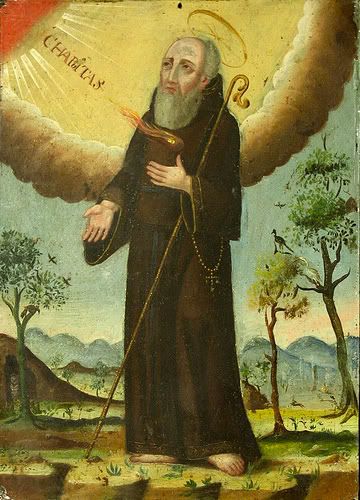 "Francis built said oratory or church and a small monastery; there he practiced a religious, hermitic, very austere life; he welcomed into his community several followers desirous of practicing the same style of life. They eat Lenten food only, live in a holy, religious and charitable manner. His (Francis') life and that of the community of his hermits has helped and still does help the welfare of many souls. And through him many good works have been accomplished".
"Francis built said oratory or church and a small monastery; there he practiced a religious, hermitic, very austere life; he welcomed into his community several followers desirous of practicing the same style of life. They eat Lenten food only, live in a holy, religious and charitable manner. His (Francis') life and that of the community of his hermits has helped and still does help the welfare of many souls. And through him many good works have been accomplished".(Msgr. Pirro Caracciolo. Petition to Sixtus IV, 1471)
 | Francis of Paola has willed and called his sons "Minims", that is the least ones, for as the least they may give witness and service to the Church for the building of the Kingdom. The evangelical ideal of conversion synthesizes the spiritual purpose of the Order of Minims. Through the vows, the Minim Friars live the fullness of their consecration, imitating Christ on the road of evangelical penance. St. Francis in fact exhorted them "to produce fruits worthy of penance, under the vows of poverty, chastity, obedience and Lenten life."(III Rule, ch. 3) |
This could be the spiritual identity card of the Minim friars of St. Francis.
The Minim friar is one who recognizes himself as a gift of God. Accepts his own fragility, is not afraid to look at himself for what he is, that is, in need of perfection. Only he who learns to know himself can have a positive encounter with others, with nature, with God. The "minim" is one who lives his humanity together with others. Without confrontation with a "you", one cannot be an authentic person. Accepting others, the minim friar uncovers the possibility of building a community of children of God.
In his relationship with God he has the fundamental and privileged relationship which gives meaning to his life. God for him is not far away and inaccessible, but he is the God-with-us, the God who became man and our travel companion.
The minim friar doesn't place himself outside of society and is by no means just a spectator of human events. His relationship with the world is not one of opposition, nor one of escape, but one of listening, interchange and dialogue. He is in the world, even if he is not of the world, to help the world look at history and go beyond it.

Order of Minim Friars of Saint Francis of Paola
The Minim Friars consist of two categories: priests and lay brothers. The religious priests, whom St. Francis willed as prophets of conversion through the preaching of the Word of God and the distribution of God's mercy, present the person of the Saint as a man of God who welcomed people with love and patience, calling them to conversion and exhorting them to intensify their own relationship with God. They are ready to go from place to place, following a simple and contemplative life style, to announce the Word of God to all, "exposing to the faithful, in a brief format, vices and virtues, punishment and prizes," (I Rule, ch 3). Like St. Francis, they try to leave in the people the joy that springs from the encounter with a person consecrated to the Lord.
The lay religious or brothers are those who exemplify more closely the style of life of the Founder and that of the first community of hermits gathered around him. Like St. Francis, who in his penance and humility knew how to be near to all, especially the simple, sharing with them the burden of manual work, the lay religious, through collaboration with the apostolic ministry of the priests, expresses his service toward the confreres, and at the same time contributes to a good community spirit. In direct contact with people, he embodies the sweetness, affability, and mercy, which characterized the human relationship of St. Francis.